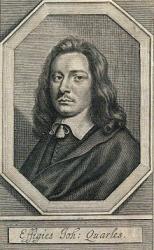1609 - 1667 Hymnal Number: d2 Author of "Ah how empty how fleeting" in Songs in the Night; or Hymns for the Sick and Suffering. 2nd ed. Franck, Michael, son of Sebastian Franck, merchant at Schleusingen, was born at Schleusingen, March 16, 1609. At the Gymnasium of his native town he made good progress, but at his father's death it was found possible only to give his brothers Sebastian and Peter a university education. Michael was accordingly apprenticed to a baker, and in 1628 became a master baker at Schleusingen. Reduced to poverty by the sufferings of war, he fled in 1640 to Coburg, was there kindly received by one of the master bakers, and in 1644, somewhat unexpectedly, was appointed master of the lower classes in the town school. He died at Coburg Sept. 24, 1667 (Koch, iii. 435-441; Allg. Deutsche Biog. , vii. 259-260).
He was a friend of Dach and Neumark; was in 1659 crowned by Rist as a poet, and afterwards received into his order of Elbe Swans. In his times of trial he found consolation in hymn writing. While many of his pieces are crude in form and expression, some are yet popular in style, and are full of faith.
The best of his hymns probably is:—
Ach wie flüchtig! ach wie nichtig. For the Dying. Appeared as the third of three hymns by Franck, published with music in four parts at Coburg, 1652, entitled Die Eitelkeit, Falschheit und Unbeständigkeit der Welt [Wernigerode], in 13 stanzas. In his Geistliches Harpffen-Spiel, Coburg, 1657 [Gotha], No. 24 with the motto
“Der Mensch und all sein Thun must mit der Zeit hergehn;
Wer Gott und Gottesfurcht recht liebt, wird ewig stehn."
Repeated in Crüger's Praxis, 1661, No. 530, and many subsequent collections, as in the Unverfälscher Liedersegen, 1851, No. 803. It is a powerful picture of the vanity and nothingness of this world and all its treasures.
The only translation in common use is:—
“0 how cheating, 0 how fleeting”, Is, &c. In full by Sir J. Bowring in his Hymns, 1825, No. 35. The translations of stanzas i., iii., iv., xiii. were included in Curtis's Union Collection, 1827, and of stanzas i.-iv., xiii. in the Plymouth Collection, 1855.
Another translation is: "Ah how fleeting, ah how cheating,” by N. L. Frothingham, 1870, p. 153. [Rev. James Mearns, M.A.]
John Julian, Dictionary of Hymnology
Michael Franck


 My Starred Hymns
My Starred Hymns




